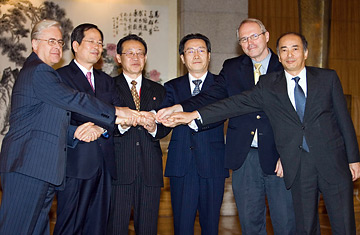
Envoys from six nations achieve progress in Beijing.
The leaders of North and South Korea came face-to-face for only the second time in more than 50 years this week and, in the end, their summit was overshadowed by a roomful of diplomats hundreds of miles away.
As North Korean dictator Kim Jong Il and South Korean President Roh Moo Hyun prepared to conclude their three days of meetings Wednesday, a breakthrough at the ongoing six-party talks between the two Koreas, China, Russia, Japan and the U.S. in Beijing dominated the headlines instead: North Korea agreed to disable its flagship nuclear reactor, disclose all its nuclear facilities by year's end and allow U.S. inspectors to make sure the job was done. In return, Washington agreed to consider taking North Korea off its list of countries that sponsor terrorism, one of Pyongyang's key demands. "It's certainly good news," says Ralph Cossa, president of the Pacific Forum CSIS, a Honolulu-based think tank. "If by the end of December the three facilities at Yongbyon are disabled to the point that it would take a year or two or three to get them back up, then we have accomplished a very important first step."
The six-party deal was a bright moment in what has turned out to be a fairly unsatisfying summit for Roh. The longtime foes were able to ink a deal promising to work toward a permanent peace agreement and boost economic ties between Seoul and Pyongyang. But the joint statement didn't really break any new ground. "We shouldn't be too impressed," says Kim Tae Woo, analyst at the Korea Institute of Defense Analysis. "The agreement does not create any dramatic changes to inter-Korean relations."
The feeling in Seoul is that Roh got very little in return for his efforts and walked away with a fuzzy agreement. And Kim, meanwhile, certainly didn't win any good will with the South Korean public either. The Dear Leader failed to attend two official dinners held for the South Korean delegation even after Roh's pledge to attend the controversial Airang Games, a massive synchronized gymnastic performance often used as a propaganda tool that glorifies the regime. Kim also appeared — to put it charitably — a little distant in Roh's company, a stark contrast to the first summit seven years ago when Kim Jong Il welcomed former president Kim Dae Jung wholeheartedly. "Roh definitely got a less emotional reception," says Paik Hak Soon, a North Korea analyst at the Sejong Institute.
Not surprisingly, the joint agreement also failed to make any mention of thorny issues such as the fate of both South Korean prisoners of war and abductees in North Korea. Perhaps Kim Jong Il will address those topics if he fulfills an earlier promise to visit the South's capital. But it's not likely.
